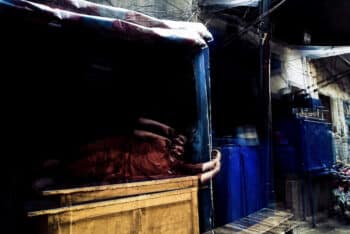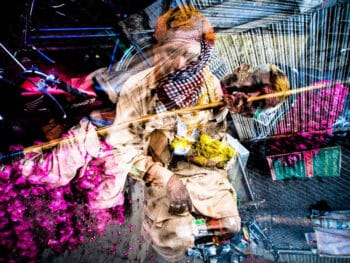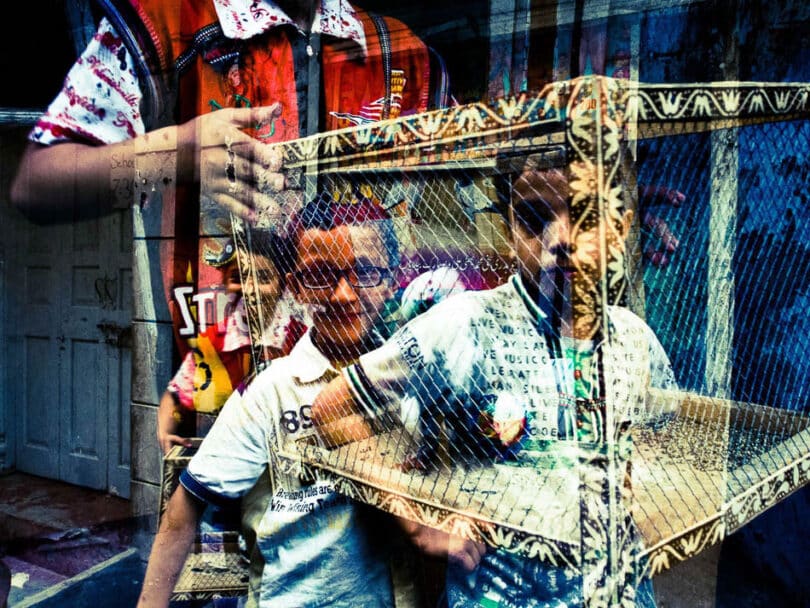Dear friends,
Greetings from the desk of Tricontinental: Institute for Social Research.
 From 9 to 15 October, the International Monetary Fund and the World Bank held their annual joint meeting in Marrakech (Morocco). The last time that these two Bretton Woods institutions met on African soil was in 1973, when the IMF-World Bank meeting was held in Nairobi (Kenya). Kenya’s then President Jomo Kenyatta (1897—1978) urged those gathered to find ‘an early cure to the monetary sickness of inflation and instability that has afflicted the world’. Kenyatta, who became Kenya’s first president in 1964, noted that, ‘[o]ver the last fifteen years, many developing countries have been losing, every year, a significant proportion of their annual income through deterioration of their terms of trade’. Developing countries could not overcome the negative terms of trade in a situation where they sold raw materials or barely processed goods on the world market while being reliant on the import of expensive finished commodities and energy, even if they raised their volumes of export. ‘Recently’, Kenyatta added, ‘inflation in the industrial countries has led to further and important losses to the developing countries’.
From 9 to 15 October, the International Monetary Fund and the World Bank held their annual joint meeting in Marrakech (Morocco). The last time that these two Bretton Woods institutions met on African soil was in 1973, when the IMF-World Bank meeting was held in Nairobi (Kenya). Kenya’s then President Jomo Kenyatta (1897—1978) urged those gathered to find ‘an early cure to the monetary sickness of inflation and instability that has afflicted the world’. Kenyatta, who became Kenya’s first president in 1964, noted that, ‘[o]ver the last fifteen years, many developing countries have been losing, every year, a significant proportion of their annual income through deterioration of their terms of trade’. Developing countries could not overcome the negative terms of trade in a situation where they sold raw materials or barely processed goods on the world market while being reliant on the import of expensive finished commodities and energy, even if they raised their volumes of export. ‘Recently’, Kenyatta added, ‘inflation in the industrial countries has led to further and important losses to the developing countries’.
‘The whole world is watching’, Kenyatta said. ‘This is not because many people understand the details of what you are discussing, but because the world looks to you to find urgent solutions to problems affecting their daily lives’. Kenyatta’s warnings went unheeded. Six decades after the meeting in Nairobi, the loss of national income to debt and inflation remains a serious problem for developing countries. But, in our time, the whole world is not watching. Most people do not even know that the IMF and World Bank met in Morocco, and few expect them to solve the world’s problems. That is because, across the globe, people know that these institutions are, in fact, the authors of pain and are simply not capable of solving the problems that they have created and exacerbated.
Ahead of the meeting in Morocco, Oxfam issued a statement that strongly criticised the IMF and World Bank for ‘returning to Africa for the first time in decades with the same old failed message: cut your spending, sack public service workers, and pay your debts despite the huge human costs’. Oxfam highlighted the economic crisis facing the Global South, pointing out that ‘more than half (57 percent) of the world’s poorest countries, home to 2.4 billion people, are having to cut public spending by a combined $229 billion over the next five years’. On top of this, they showed that ‘low- and low-middle income countries will be forced to pay nearly half a billion dollars every day in interest and debt repayments between now and 2029’. Though the IMF has said that it plans to create ‘social spending floors’ to prevent cuts in government spending on public services, Oxfam’s analysis of 27 IMF loan programmes found that ‘these floors are a smokescreen for more austerity: for every $1 the IMF encouraged governments to spend on public services, it has told them to cut six times more than that through austerity measures’. The fallacy of ‘social spending floors’ has also been demonstrated by Human Rights Watch in its recent report, Bandage on a Bullet Wound: IMF Social Spending Floors and the COVID-19 Pandemic.
 At Tricontinental: Institute for Social Research, we continue to monitor the IMF’s impact on developing economies, including in our new dossier, How the International Monetary Fund Is Squeezing Pakistan (October 2023). Written and researched by Taimur Rahman and his colleagues at the Research and Publications Centre (Lahore, Pakistan), the dossier lays out the structural problems facing Pakistan’s economy, such as low productivity in its export-oriented industry and the high costs of imported luxury goods. Because of the lack of investment in industry, Pakistan’s labour productivity is low, and so its exports are priced out by other countries (as is the case with the textile industry in Bangladesh, China, and Vietnam). Meanwhile, the import of luxury goods would be far more devastating for the economy if not for the dollars earned by remittances from hard-working but ignored Pakistani workers, mainly in the Gulf states. Pakistan’s ballooning deficit, the dossier explains, is ‘driven by the fact that Pakistan is no longer competitive in the international market and has continued to import goods and services at a rate that it simply cannot afford’. Furthermore, ‘IMF-imposed conditions have further dried up the investment that Pakistan sorely needs to upgrade its infrastructure and accelerate industrialisation’. Not only does the IMF prevent investment for industrialisation, but it enforces cuts on public services (importantly, for health and education).
At Tricontinental: Institute for Social Research, we continue to monitor the IMF’s impact on developing economies, including in our new dossier, How the International Monetary Fund Is Squeezing Pakistan (October 2023). Written and researched by Taimur Rahman and his colleagues at the Research and Publications Centre (Lahore, Pakistan), the dossier lays out the structural problems facing Pakistan’s economy, such as low productivity in its export-oriented industry and the high costs of imported luxury goods. Because of the lack of investment in industry, Pakistan’s labour productivity is low, and so its exports are priced out by other countries (as is the case with the textile industry in Bangladesh, China, and Vietnam). Meanwhile, the import of luxury goods would be far more devastating for the economy if not for the dollars earned by remittances from hard-working but ignored Pakistani workers, mainly in the Gulf states. Pakistan’s ballooning deficit, the dossier explains, is ‘driven by the fact that Pakistan is no longer competitive in the international market and has continued to import goods and services at a rate that it simply cannot afford’. Furthermore, ‘IMF-imposed conditions have further dried up the investment that Pakistan sorely needs to upgrade its infrastructure and accelerate industrialisation’. Not only does the IMF prevent investment for industrialisation, but it enforces cuts on public services (importantly, for health and education).
In July, the IMF approved a $3 billion stand-by agreement with Pakistan that it claimed would create ‘the space for social and development spending to help the people of Pakistan’. However, the IMF is simply feeding Pakistan the same tired neoliberal package, calling for ‘greater fiscal discipline, a market-determined exchange rate to absorb external pressures, and further progress on reforms related to the energy sector, climate resilience, and the business climate’—all measures that will exacerbate the crisis. To ensure the permanency of these policies, the IMF spoke not only with the government of Caretaker Prime Minister Anwaar-ul-Haq Kakar, but also with former Prime Minister Imran Khan (who was removed from office in 2022 in a move that was encouraged by the United States due to his neutrality on the war in Ukraine). As if this were not enough, through its role facilitating the agreement, the U.S. government pressured the Pakistani government to supply weapons to Ukraine in secret through the disreputable arms dealer Global Ordnance. This makes an already bad deal even worse.
Similar deals have been made with countries such as Argentina, Sri Lanka, and Zambia. In the case of Sri Lanka, for instance, the institution’s senior mission chief for the country, Peter Breuer, described the IMF agreement as a ‘brutal experiment’. The social consequences of this experiment will, of course, be borne by the Sri Lankan people, whose frustrations have been stifled by the police and military forces.
This dynamic was also on display in February in Suriname, where large numbers of people who took to the streets to protest against the IMF-imposed austerity regime were met with tear gas and rubber bullets. Since the start of the COVID-19 pandemic, Suriname has defaulted three times on its foreign debt, which is largely owed to wealthy bondholders in the West, and in December 2021 the government of President Chan Santokhi told the IMF that it would cut subsidies for energy. We zijn Moe (‘We Are Tired’), a movement against austerity, protested for years but could not move an agenda against the IMF-imposed starvation politics. ‘A hungry mob is an angry mob’, Maggie Schmeitz wrote of the protests.
 These protests—from Suriname to Sri Lanka—are the latest cycle in a long history of IMF riots, such as those that began in Lima (Peru) in 1976 and sprung up in Jamaica, Bolivia, Indonesia, and Venezuela in the years that followed. When the IMF riots unfolded Indonesia in 1985, long-time CEO of the Bank of America Tom Clausen was presiding over the World Bank (1981—1986). In remarks that he made five years prior, Clausen encapsulated the attitude of the Bretton Woods institutions towards such popular uprisings, stating that ‘When people are desperate, you have revolutions. It’s in our own evident self-interest to see that they are not forced into that. You must keep the patient alive, because otherwise you can’t effect the cure’.
These protests—from Suriname to Sri Lanka—are the latest cycle in a long history of IMF riots, such as those that began in Lima (Peru) in 1976 and sprung up in Jamaica, Bolivia, Indonesia, and Venezuela in the years that followed. When the IMF riots unfolded Indonesia in 1985, long-time CEO of the Bank of America Tom Clausen was presiding over the World Bank (1981—1986). In remarks that he made five years prior, Clausen encapsulated the attitude of the Bretton Woods institutions towards such popular uprisings, stating that ‘When people are desperate, you have revolutions. It’s in our own evident self-interest to see that they are not forced into that. You must keep the patient alive, because otherwise you can’t effect the cure’.
Clausen’s ‘cure’—privatisation, commodification, and liberalisation—is no longer credible. Popular protests, such as those in Suriname, reflect the broad awareness of the failures of the neoliberal agenda. New agendas are needed that will build upon the following ideas, such as:
- Cancelling odious debts, namely those taken by undemocratic governments and used against the well-being of the people.
- Restructuring debt and forcing wealthy bondholders to share the burden of debts that cannot be fully repaid (without wreaking devastating and fatal social consequences) but from which they benefited for decades.
- Investigating the failure of multinational corporations to pay their fair share of taxes to poorer nations and establishing laws that prevent forms of theft such as transfer mispricing.
- Investigating the role of illicit tax havens in allowing elites in the poorer nations to ferret away the social wealth of their countries in these places and procedures to return that money for public usage.
- Encouraging the poorer nations to take advantage of new lenders that are not committed to austerity-debt forms of lending, such as the Peoples Bank of China and the New Development Bank.
- Developing industrial policies that are geared toward creating jobs, lessening the destruction of nature, and progressively adopting renewable energy sources.
- Implementing progressive taxation (especially on profit) and a living wage in order to ensure fair income for workers as well as wealth distribution.
This list is not comprehensive. If you have other ideas for a credible ‘cure’, do write to me.
The photographs featured in this newsletter and the dossier are by Ali Abbas (‘Nad E Ali’), a visual artist based in Lahore, Pakistan, whose work explores themes of alienation, belonging, and the in-between spaces that exist in all cultures. The photographs are from his series ‘Hauntology of Lahore’ (2017—present), borrowing the term from philosopher Jacques Derrida. In Abbas’s words, ‘within the very landscape of Lahore, amidst its bustling streets, ancient structures, and vibrant communities lies a reservoir of untapped futures and unrealised potential’.
Warmly,
Vijay

